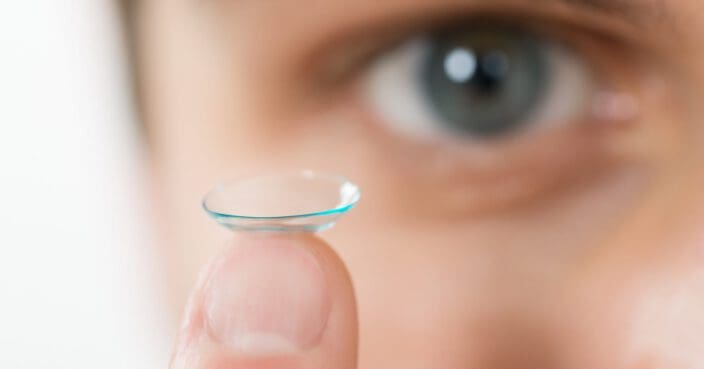Further Reading
Can Daily Contacts Be Worn More Than Once? (What Doctors Say)
Home / Understanding Contacts /
Last Updated:
Daily contacts should not be worn more than once. Contacts need to be replaced at regular intervals as indicated by your doctor and the manufacturer.
Table of Contents
Of the nearly 50 million Americans who wear contact lenses, the American Optometric Association (AOA) reports that close to half of the adults wearing them use them for longer than the recommended length of time.
The U.S. Food and Drug Administration (FDA) explains that there are several types of contacts, and different forms of daily use contacts may be approved for varying lengths of time. A daily use contact is one that is taken out each night.
Can You Reuse Daily Contacts
Depending on the type, you may be able to reuse daily contacts. There are two main forms of daily use contacts: daily disposable and daily reusable contacts that are on a specific replacement schedule.
- Daily disposable contacts are not meant to be reused. They are to be discarded each night and replaced with brand new ones the next day.
- Daily reusable contacts may be taken out each night, cleaned and disinfected, and then reused the next day. These contacts have a specific replacement schedule as outlined by the manufacturer and explained by your doctor. Some may need to be replaced weekly, while others may be reusable for up to 30 days.
You deserve clear vision. We can help.
With 135+ locations and over 2.5 million procedures performed, our board-certified eye surgeons deliver results you can trust. Your journey to better vision starts here.
Wearing daily contacts more often than recommended can greatly increase the risk for eye infection and other eye-related issues. It is important to follow your doctor’s instructions when replacing and reusing contacts in order to maintain your eye health.

The Safety of Using Daily Contacts More Frequently
Daily use contacts are designed to be taken out each night and not worn overnight. Some daily use contacts are meant to be discarded after each use (daily disposable contacts), while others can be reused the next day after cleaning and disinfecting them (daily reusable or replacement schedule contacts).
The FDA does not approve multi-day use of daily disposable contacts, as these are meant to only be worn once to prevent eye infections. They are not designed for multiple uses. Daily disposable contacts are thinner than other types of contact lenses and therefore will not hold up well for reuse.
It is important to follow your doctor’s recommended replacement schedule for daily use of reusable contacts. Daily use contacts should never be worn overnight.
Daily reusable contacts may be rigid gas-permeable (RGP) and usable for up to a year with proper care. Or, they may be soft plastic contact lenses that need to be replaced on a specific schedule — usually every week or month, depending on the type and brand.
Replacing daily contacts can add up financially. It can be tempting to use them for longer than recommended, but doctors advise against this practice. It can lead to many potential problems, which ultimately cost you more money in the long run.
You deserve clear vision. We can help.
With 135+ locations and over 2.5 million procedures performed, our board-certified eye surgeons deliver results you can trust. Your journey to better vision starts here.
The Importance of Following Recommended Contact Replacement Schedules
Each year, there are close to 1 million doctor visits related to eye infections caused by contact lenses. Many of these visits are due to improper hygiene, such as not washing your hands prior to handling your contacts. A lot of these visits are also due to using daily wear contacts for longer, or more often, than they are intended to be worn.
Manufacturers and doctors set up a contact replacement schedule on purpose, to promote eye health and keep you as safe as possible. Contacts are an effective vision replacement tool and safe when used as directed. When they are used outside of the directed parameters, problems can develop.
As reported in the Canadian Medical Association Journal (CMAJ-JAMC), people who wore contacts beyond their recommended shelf-life experienced far more eye-related issues than those who stuck to the doctor-recommended replacement schedule. While you may get lucky and not experience a problem right away, the first problem you do experience could be serious. The more you reuse them, the more you put yourself at risk for a significant issue.
Issues Related to Extended Wear
Reusing daily contacts beyond their recommended schedule can lead to these issues:
- Eye infection
- Dry eyes
- Corneal ulceration and scarring
- Visual impairment and possible blindness
The journal of the American Academy of Optometry, Optometry and Vision Science, published a study where they looked at daily disposable contact lenses that were saved after one use and stored overnight. The findings showed that 95 percent of users had at least one pair (out of five in the span of a month) of lenses that were contaminated with bacteria such as staphylococci.

This study proves that overnight storage of daily use contact lenses can lead to a buildup of bacteria; if placed back in the eye, the bacteria can lead to serious eye infections.
Daily disposable contacts don’t allow oxygen to travel through to the eye or hold moisture well. This can lead to extreme dry eyes, corneal scarring, and therefore impaired vision, which may even lead to the need for a corneal transplant.
One of the most significant potential risks for eye infections caused by improper contact lens use is keratitis, which is a bacterial infection that affects the cornea. The cornea is the clear covering in the front of the eye.
A corneal infection, keratitis, can cause your eyes to become red and irritated, weep, and hurt. It can lead to blurred vision, sensitivity to light, and even result in blindness in serious cases. Mayo Clinic publishes that overuse of contact lenses, or using them more often or beyond the recommended length of time, can cause infectious keratitis.
Daily use contacts can be some of the safest types of contacts, as they are taken out each night to allow proper oxygen flow to the eyes. Daily disposable contacts can reduce the risk for infection greatly by decreasing the potential for bacterial buildup. Daily disposable contacts do not need to be cleaned or disinfected, which can make them more convenient as well.
Most issues that can arise from contact lenses generally stem from improper hygiene or use. When using contact lenses, follow your doctor’s directions on how often to change and replace them. Clean them properly and change the disinfecting fluid as directed when dealing with reusable daily contacts. Wash your hands before touching the contacts or your eyes, and dispose of the contacts on time.
Resist the urge to stretch use of your contacts beyond their set schedules. This will ensure optimal eye health.
You deserve clear vision. We can help.
With 135+ locations and over 2.5 million procedures performed, our board-certified eye surgeons deliver results you can trust. Your journey to better vision starts here.
References
- Complications of Contact Lenses. (May 2021). JAMA Network.
- Facts and Stats. (August 2017). American Optometric Association.
- Types of Contact Lenses. (January 2018). U.S. Food and Drug Administration.
- Contact Lens-Related Eye Infections. (April 2021). American Academy of Ophthalmology.
- How to Take Care of Contact Lenses. (September 2018). American Academy of Ophthalmology.
- How Safe are Contact Lenses? (November 2014). The Guardian.
- Calculating Risk in Use of Disposable Contacts. (April 2012). CMAJ-JAMC.
- Contamination Risk of Reusing Daily Disposable Contact Lenses. (December 2011). Optometry and Vision Science.
- Keratitis. (November 2018). Mayo Clinic.
- When You Wear Contacts Every Day, This Is What Happens to Your Eyes. (March 2021). The List.
- Rare Eye Infection, Vision Loss Result From Wearing Contacts While Showering. (July 2019). The Washington Post.
This content is for informational purposes only. It may have been reviewed by a licensed physician, but is not intended to serve as a substitute for professional medical advice. Always consult your healthcare provider with any health concerns. For more, read our Privacy Policy and Editorial Policy.